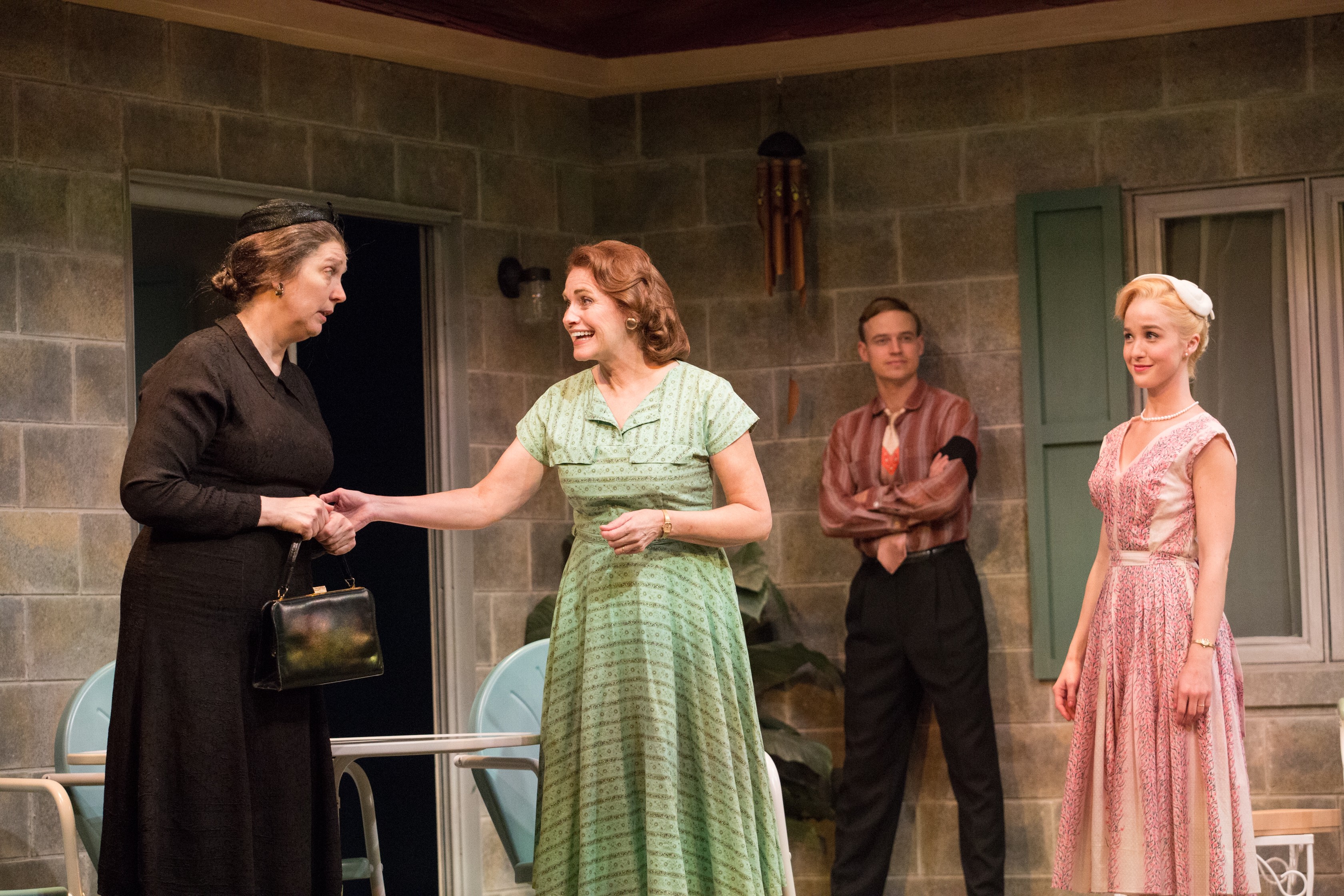REVIEW BY CARY GINELL
In See Rock City, the second installment of Arlene Hutton’s trilogy about a post-World War II family, aspiring novelist Raleigh Brummett had left for New York to pursue his career, leaving his school teacher wife May behind in the rural town of Corbin, Kentucky. Hutton’s trilogy about the Brummetts, a family struggling to stay together amid everyday challenges, concludes with the third and final chapter, Gulf View Drive, which plays through Sunday at the Rubicon Theatre Company in Ventura.
When the play opens, time has advanced five years, and the Brummetts are now living in a sturdy cinder block beachfront home in Siesta Key, near Sarasota, Florida. Raleigh’s career has taken off, thanks to his series of Mark Twain-like adventures about “a boy in a boat,” which may or may not be autobiographical. May believes they are, and sees uncomfortable parallels between some of the themes in Raleigh’s novels and their own lives. In Last Train to Nibroc and See Rock City, the first two stories in the trilogy, we got to know – and like – Raleigh and May, through all of their faults as well as their endearing traits. Raleigh has been severely damaged by his mother, a demanding grump who constantly berated and disparaged her son. Raleigh was discharged from the army after he was diagnosed with epilepsy, and when his writing career failed to bear fruit, he saw his self-esteem plummet. In Gulf View Drive, we find a new Raleigh, confident and full of humor, proud to not have to depend on his wife’s income for sustenance.
In addition to Raleigh and May, Gulf View Drive reprises appearances by their respective mothers, but has also added an important secondary character, Raleigh’s sister Treva, who was only referred to in the previous installments. During the course of the play, each of the five family members reveals and confronts great traumas in their lives, some of which predict the nascent civil rights era.
English director Katharine Farmer returned to helm Gulf View Drive; she won an Ovation Award for her work on See Rock City and an Indy for Last Train to Nibroc, but this third effort is arguably the best of the three. Farmer and the four returning actors from the previous installments have by now become a nuclear family themselves, and their deep understanding of their characters makes for a rich, wholly fulfilling, emotional experience. The charm, wit, and drama flow from these gifted performers, and in the talkback session at the end of Wednesday evening’s performance, audience members vocally pleaded for them to somehow keep the story going.
The theme that becomes readily apparent as the play unfolds is the bravery of this family as they deal with their struggles. Raleigh is trying to decide whether or not to return to New York to rejuvenate his creative juices, which have gone stale in Florida, in the process risking his marriage. Cracks have appeared in May’s cheery solidity because of the decision Raleigh has to make, as well as incidents, real and imagined, in her own past. The couple’s mothers, now both widowed, are living with them and having difficulties adjusting to the new lifestyle. Treva, a battered wife who has fled her husband and children, is dealing with her own future prospects, which are complicated when she realizes she is pregnant.
Erik Odom once again plays Raleigh with an amiable confidence that he lacked in the first two plays. He constantly teases his mother about the Florida wildlife, both insects and vertebrates, and appears to be settled and happy with his life. But there is something disquieting about his joviality until we realize there has been a boiling cauldron underneath the surface of his sunny disposition which finally explodes at the end of Act I.
Lily Nicksay’s May is also a contradiction, although she appears more troubled and suspicious by Raleigh’s behavior than she was in See Rock City, when she was the strong, maternal figure. Nicksay, in a variety of exquisite period costumes, is revealed in Gulf View Drive to be not quite the rock of the family that she was before. Her voice, which still has that beautifully honeyed Kentucky drawl, has taken on a disturbing musicality.
In our review of See Rock City, we noted how Clarinda Ross’s portrayal of Mrs. Brummett was like watching Minnie Pearl without her sense of humor. In her first scene in Gulf View Drive, she’s dressed in somber brown, a stark contrast to the bright colors worn by Raleigh and May. But once she becomes acclimated to her new Florida domicile, her wardrobe brightens up considerably. Her tart, sharp tongue dominates the household and is the burning fuse that eventually sets off Raleigh’s eruptive ire.
Sharon Sharth reprises her role as Mrs. Gill. She has been living with Raleigh and May but now has eyes on a widower neighbor. It is she who Raleigh and May open up to, instead of Mrs. Brummett. Newcomer Faline England is fabulous as Raleigh’s sister Treva, and quickly defines her character with a realistic and heartwarming performance. Treva is the true hero of the story, bravely seeking out new frontiers as she abandons her abusive husband and tries to find herself in her new surroundings.
For much of the play, Treva mopes around the house, ignoring chores and spending time watching television. She is not as bright as Raleigh, but expresses her feelings better. “I don’t like Harold!” she blurts to her mother about her husband. “You don’t have to like him. You’re married to him,” Mrs. Brummett snaps, one of her many funny and caustic rejoinders in the play.
The script includes frequent mentions of 1950s shows like as Topper and Search for Tomorrow, but the key program reference indirectly presents a lesson to all five characters. It happens when Treva interrupts a tense confrontation between Raleigh and May by telling them about an episode of Queen For a Day, an early reality show in which contestants compete for audience approval by telling how they overcame adversity, either financial or personal. One contestant in particular caught Treva’s attention, a woman who had lost both of her arms, yet still managed to function and take care of herself. The story became a running gag during Act II of the play, but its repetition serves as a signpost to the five characters whose problems are significantly less challenging than the woman’s. The Queen for a Day episode has a significant effect on Treva, who decides to put her past behind her and enroll in the nursing school at Berea College in Kentucky, a revolutionary move for an unmarried, pregnant woman in the 1950s. When Treva suggests to Raleigh and May that they adopt her baby, May pauses. “Raisin’ a child is a lot of work,” she says, but Mrs. Gill responds, “You’ve got two arms. That’s all you need,” indirectly referencing the woman on Queen for a Day.
Farmer’s direction is outstanding, especially in the succinct pacing of the dialog. In the talkback session, Farmer explained how she was fascinated by Americana and took great pains in reproducing the Florida setting, a back yard lanai complete with two palm trees. The excellent lighting and set design are by Mike Billings, who also worked on the first two stories in the trilogy. Marcy Froehlich was responsible for the wonderful costume design. Sound designer Austin Quan gave the setting evocative sounds of period music during the blackouts as well as nighttime crickets and the murmuring of the television inside the house.
Gulf View Drive is an emotionally rich look at Americana at mid-century, with a superior cast, universally likable, yet complex characters, and a story that deftly balances drama and humor.
*********************
Gulf View Drive closes Sunday, February 12. For showtimes, see the VC On Stage Calendar.






No Comments